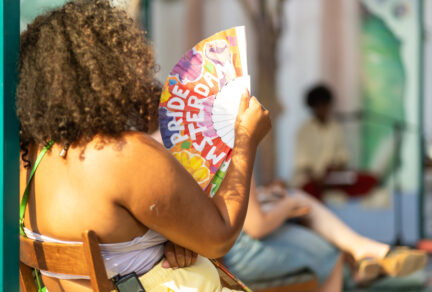
Queer Care Conversation #2: Alex Blum
1 August 2024
5:00 p.m. – 6:00 p.m.
Artist talk on the performance SISTER SONGS on the eve of the Pride edition of Silence.
On the eve of the special Pride edition of Silence, we are organizing a second Queer Care Conversation. Mariette Dölle, Director of the Oude Kerk, will engage in dialogue with guest curator Julia Visser and choreographer Alex Blum about Blum's graduation project and performance, SISTER SONGS.
Taking pride as a focal point for the queer care conversation, we reflect upon the role of 'care' in activism. Care and activism are strongly connected in Pride, and requires recourses mobilized by the queer community. 'Activism is not a sprint, we run a marathon' as Blum says.
Voice, chant, and singing are powerful tools in casting out anxiety, bring down levels of adrenaline, and manifest friendships and alliances. As a curator, Julia Visser is particularly interested in how song manifests networks of solidarity. Song has been part of the historical repertoire of the old church over the centuries, with its expressive form morphing along with the shifts of ruling classes - Catholicism, Protestantism, and being a contemporary art space. Blum mentions her sonic sculpture to be a way of “sistering.” What does she mean with this? And how does the particularity of the trans femme voice manifest in a world of relations and solidarity?
Pride edition of Silence
On Friday, August 2, during a special Pride edition of the music series Silence, Alex Blum will present SISTER SONGS. A performance exploring the relationship between vocal characteristics and their use beyond gender norms. Pitch and vocal quality are typically considered key indicators of gender identity. Certain voices are traditionally perceived as distinctly male or female. But what lies beyond this standardized notion?
More information and tickets for Pride-Silence.

About the Queer Care Conversations
For centuries, the Oude Kerk has been a place where various forms of social care for vulnerable groups were organized. For instance, charitable initiatives and religious orders dedicated to caring for the poor and orphans had their own chapels within the church. In this series on queer care, curator Julia Visser engages with contemporary forms of care for vulnerable groups, drawing from this historical context.
